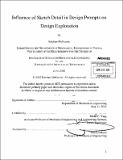Influence of sketch detail in design prompts on design exploration
Author(s)
McKenzie, Esteban
DownloadFull printable version (5.352Mb)
Other Contributors
Massachusetts Institute of Technology. Dept. of Mechanical Engineering.
Advisor
Maria C. Yang.
Terms of use
Metadata
Show full item recordAbstract
This study sought to observe how the type of shape they are presented with influenced designers' early creative process. One of three shapes, with varying degrees of detail and concreteness, were shown to respondents at random. The respondents were asked to sketch designs for a lemon squeezer based on the inspirational shape they were shown. The concepts were then grouped by to the inspirational shape they were based on. The designs were rated on the categories of feasibility, similarity to existing products, number of perspectives drawn, the presence of annotations, and the ease of which the concept could be understood. When the results were analyzed, it was found that the number of perspectives drawn and the presence of annotations were the only categories that varied by the inspirational shape group. The more open-ended shape corresponded with respondents drawing more perspectives of their concept on average, and including annotations more often, while the most well defined shape had fewer perspectives drawn, and fewer concepts with annotations. The categories of feasibility, similarity and clarity had no variation between groups of people who received different inspirational shapes. These results suggest that the more open-ended inspirational shape gave respondents mental leeway to be more expansive in their descriptions, and less constrained to basic representations.
Description
Thesis (S.B.)--Massachusetts Institute of Technology, Dept. of Mechanical Engineering, 2012. Cataloged from PDF version of thesis. Includes bibliographical references (p. 27).
Date issued
2012Department
Massachusetts Institute of Technology. Department of Mechanical EngineeringPublisher
Massachusetts Institute of Technology
Keywords
Mechanical Engineering.